To my son, I leave my passion for knowledge…
You may have already drafted a Last Will and created an estate plan that transfers your worldly possessions. Your estate plan should not end there. What steps have you taken to ensure that you also pass on your values, ideas and beliefs? What wisdom and life lessons do you want to share with those you care about? Do you want to be remembered for your values rather than for the possessions you have left behind? If so, you may want to consider drafting an ethical will. As the name suggests, ethical wills are the spiritual counterparts to “traditional” Wills that distribute wealth. Ethical wills pass on intangible assets such as blessings, life lessons, dreams and hopes as opposed to tangible possessions. While ethical wills are not binding legal documents, they can be an invaluable gift to friends, family members and loved ones.
Preparing to draft an ethical will often involves serious consideration of your values and morals, important lessons learned, hopes and dreams for the future, advice to loved ones, invaluable memories and important events in your life. You may also contemplate themes, such as regrets and forgiveness, personal love, mentors and teachers, cultural beliefs, ancestry or how you would like to be remembered by others.
Although writing an ethical will is a serious endeavor, it does not need to be a complicated process. Unlike “traditional” Wills that are bound by statutory constraints, there is no set form or procedure for creating an ethical will. An ethical will can be a letter to loved ones or to grandchildren not yet born. An ethical will may also be a set of instructions regarding the family business or a detailed account of a life journey. An ethical will may choose to develop and impart a family mission statement or provide blessings for future generations. Additionally, an ethical will does not need to be limited to writing. It may incorporate multimedia messages, such as photos, drawings, music or videos. Your personal preferences are the only constraints.
Bequeath more than your valuables. Create an ethical will and bequeath your values too.
Source: Gina M. Barry, Esquire of the law firm of Bacon Wilson

